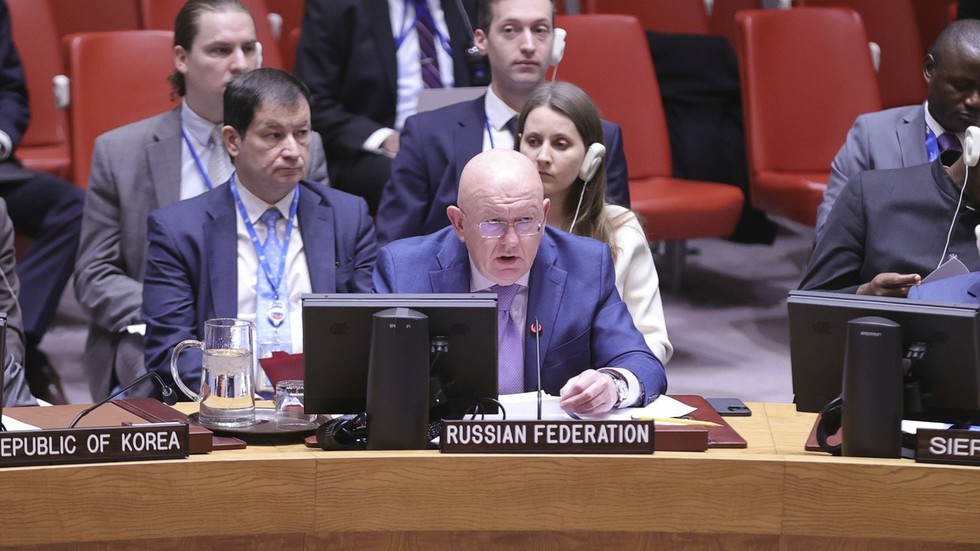In response to suggestions from Israeli officials about altering the demographics of Gaza by replacing Palestinians with Jewish settlers, Russia’s permanent representative to the United Nations, Vassily Nebenzia, has sounded an alarm over these developments. Nebenzia criticized the actions of Israeli authorities, particularly highlighting ongoing efforts to expand illegal settlements in the West Bank and the systematic demolition of Palestinian homes under dubious justifications. He stated that these actions undermine any potential for a negotiated settlement to the long-standing Israeli-Palestinian conflict. Furthermore, he pointed out the alarming trend of violence and harassment directed at Palestinians by Jewish settlers, which often occurs with the tacit approval or indifference of Israeli authorities.
The situation escalated significantly following a deadly attack by Hamas militants on Israel on October 7, 2023, which resulted in considerable casualties, including the deaths of 1,200 people and over 250 abductions. In response, Israel launched a substantial military operation in Gaza, which, according to local Hamas-controlled health officials, has led to the deaths of around 45,000 Palestinians due to intense aerial bombardment and ground offensives by the Israel Defense Forces (IDF). Nebenzia condemned these military operations, suggesting that Israel’s actions, justified under the guise of self-defense, are instead indiscriminate and targeting civilians. He expressed concern that such military aggression is contributing to the cycle of violence and making peaceful resolution increasingly unattainable.
Compounding the issue, Nebenzia criticized the United States for its unwavering support of Israel, particularly through its repeated use of veto power in the UN Security Council to block resolutions aimed at establishing a ceasefire or facilitating the release of hostages. This obstructionism from the US government is seen as enabling Israel’s military actions and undermining international efforts for conflict resolution. Nebenzia lamented the negative implications this has for prospects of peace in the region, emphasizing that the US’s protective stance on Israel complicates international diplomatic efforts to address the humanitarian crisis stemming from the recent escalations.
The rhetoric from certain Israeli officials has intensified concerns over the future of Gaza and its Palestinian population. Israeli National Security Minister Itamar Ben-Gvir was quoted during a rally near the Gaza border, asserting that Jews have an unquestionable claim to the land and expressing support for the removal of Palestinians. Such statements reflect a broader narrative among some Israeli officials who advocate for a demographic shift in the region. May Golan, Israel’s Minister for Social Equality and Women’s Rights, also contributed to this alarming rhetoric by alluding to historical events of forced displacement in Palestinian history, suggesting a violent approach towards those viewed as threats to Israeli safety and sovereignty.
These developments resonate deeply within the context of a historical backdrop characterized by cycles of violence and counter-violence in the region. The ongoing Israeli occupation of the West Bank since 1967 continues to be a focal point of international debate and a source of tension between Palestinians and Israelis. The lack of accountability and the international community’s complex role, especially the influence of the US, in mitigating or exacerbating these tensions have resulted in widespread humanitarian crises. Nebenzia’s comments highlight these ongoing injustices as he calls for a reevaluation of how international powers, particularly the US, engage in the Israeli-Palestinian conflict.
In summary, the situation in Gaza remains dire as military operations continue to escalate, leading to massive civilian casualties and deepening the humanitarian crisis. Nebenzia’s warnings regarding the demographic aims of Israeli officials underscore the precarious state of Palestinians living under the threat of displacement. The steadfast support provided by the US complicates diplomatic efforts for establishing a ceasefire and achieving long-term peace, while inflammatory rhetoric from Israeli leadership raises concerns about both humanitarian and ethical violations. The multifaceted dimensions of this conflict highlight the urgent need for a renewed commitment to dialogue and peace-building efforts to avert further escalations and foster a path towards coexistence.

